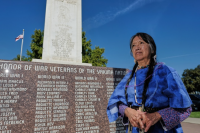Alfrieda Peters shares how she's working to protect the Columbia from Hanford’s nuclear legacy.
Hanford Cleanup Advocate Alfrieda Peters

Alfrieda Peters serves as the education and outreach specialist for the Yakama Nation Environmental Restoration and Waste Management (ERWM) Department. Peters began her career working for the late Dr. Russell Jim, founder of the Yakama Nation ERWM, who was instrumental in giving the nation a voice at the congressional table on nuclear waste cleanup.
What motivates you to engage Yakama Nation citizens to protect the Columbia from Hanford’s nuclear legacy?
The long history of our ancestral lands started prior to Hanford’s establishment. There needs to be a reminder that Yakama Nation was here before Hanford, before Washington became a state, before the Treaty of 1855 at Walla Walla, and before Lewis and Clark. Now there is an overlapping and combined history between Yakama Nation and Hanford. The public must realize that Hanford is within Yakama Nation ceded-area lands, and we still have ceded-area rights. The Columbia River, the lands, and the salmon tie us to Hanford.
My dad was a fisherman and my grandmother dried salmon. My main nourishment through my growing years was salmon, our cultural food. We need to understand how Hanford impacted the Columbia and salmon, and what threats remain.
What is the most challenging part of your job?
Taking the science and making it into public-friendly information. People go through a lot of internal alarms and thought-processing. What can we do about it? How can we ensure our health and safety aren’t impacted? How does Hanford affect our treaty rights? Those are major questions and concerns the Yakamas have. However, those alarms will push them to actively seek information, become involved, and tell others of their concerns.
What are your thoughts on how Columbia Riverkeeper works in solidarity with Yakama Nation on Hanford cleanup?
On a personal level, I appreciate that Riverkeeper has a great interest in impacts not only on the river, but on the lives of all people in the area, up and down the river. And Riverkeeper is willing to put themselves out there and meet the individuals—whatever their background. Riverkeeper worked in solidarity with Yakama Nation on a proposal to barge garbage and on coal export. We have some common concerns in our protection of the river, and Riverkeeper has proved to be a partner that we can trust.
If Hanford wasn’t a radioactive and toxic cleanup site, how would Yakama Nation citizens use the area and exercise treaty rights?
First of all, we would be there, actively living our way of life. Fishing, collecting our traditional foods and medicines, going to sacred areas. I believe our families would still be walking the lands and our elders would be telling stories of the land. I can imagine them saying, “You know the moccasins of your great-great-grandparents walked here.” The prayer songs of our people would drift whatever direction the air carried them over the lands, water, and wildlife. The songs are not just for tribal people. The Yakamas would ask for blessings of all life—not just human life. A cultural reverence.
How did your childhood influence your decision to work for Yakama Nation in public outreach?
Often times our parents and elders convey to us, “When you’re born into a tribal nation, you are born with a responsibility, depending where you place your efforts, to protect the lands, resources, and our rights.” They gifted forward the verbal teachings and tribal traditional knowledge, legends, and counsel they recall from memories of past elders or spiritual leaders. Once it is handed down, now it is up to us to bring those ancestral voices forward when it comes time to protect and be an advocate for our cultural resources and treaty rights. This is how the traditional teachings and ancestral history and voices are brought forward. It continues to thrive. For me, it is public outreach, and I had great mentors—tribal and non-tribal.
Do you have a favorite spot on the Columbia River?
I find myself returning over and over to my birthplace: Celilo. Even though Celilo Falls in underwater, I feel the pull and reminisce. I remember the sound and mist from the water. The activity of the fishermen. Families filleting fish. I remember my grandmother’s dried salmon in the smoke sheds—the aroma was very inviting. I knew there would be many enjoyable meals. Now I go down to the water and revitalize myself, wash myself with the water from the river. It is my own spiritual feeling—home.
What keeps you inspired to work on Hanford cleanup?
That our great-great-grandchildren will be able to walk these lands sometime in the future. That they will continue to share ancestral history, identify ancestral elders, and the legends, and the unborn generation will carry it forward. We’ve heard about the pre-history, the stories of how the Big Flood—what you call the Missoula Floods—created the Columbia River. Now we come to the present day and our history is added to those accounts. This includes the eloquent articulation of our former director, Atwai Dr. Russell Jim. When I am speaking to the public, I acknowledge and honor his acute insight on the consequences of the Hanford Nuclear Site in our backyard and his testimony that ensured the Yakama Nation and other tribes have an active voice and input in the cleanup. When we speak about Yakama Nation and Hanford, it is the message of Atwai Dr. Jim’s, now an ancestral elder, that goes forward.
Take a stand for clean water and healthy communities. Your membership protects and restores the mighty Columbia River now and for future generations.
Columbia Riverkeeper's River Currents newsletter showcases the effective and diverse work that you make possible.


